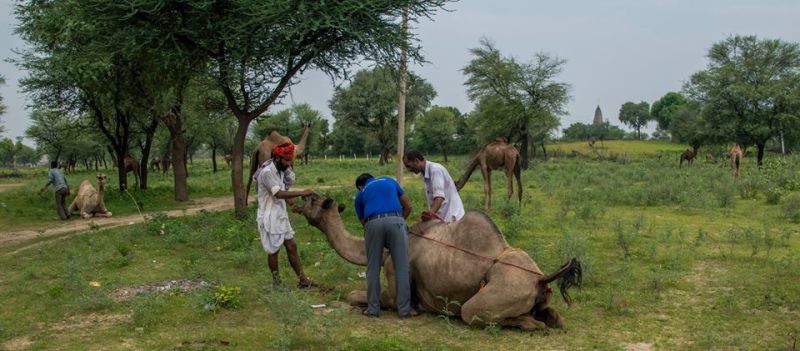During my time at Help in Suffering, many of my favourite days were spent with Dr Swami on the camel clinic. I felt more at home with the preventative approach to veterinary care and enjoyed being around the good-natured humour of the camel team. I was allowed to get fairly hands-on, under the watchful eye of the vet and while I was injecting numerous bitterly protesting camels, I was being eagerly followed around by an audience of locals. The camel owners also took great delight in the fact that a white girl had treated his camel and they eagerly offered me camels milk which I was quietly warned off by Dr Swami who explained that due to lack of pasteurisation, TB was a big problem. It was during one of these trips out with the camel crew that after nearly 4 weeks in one of the hottest countries in the world, that I finally caught sun! According to Jack, the manager at HIS, getting a tan in the city was notoriously difficult as the UV struggles to penetrate through the filth in the air …. lovely! Another reason I loved going out with the camel clinic was that I always got to share Dr Swami’s lunch…. boy could his wife cook! I broached the subject with Swami as to why I was such an attraction to which he explained that our skin colour in India is considered beautiful and is very much sought after. Swami said that Indian women spend a fortune trying to make themselves look more “white” by waxing their arms and backs, trying to bleach their skin and all other manner of things to look more western. To us this seems so bizarre because we spend all our time sun worshipping, trying so desperately to tan and although we wax and shave certain parts of ourselves, our arms and backs are for the most part left untampered with. I find it very sad that the Indian women want so desperately to look like us, I find them so beautiful and exotic with their lovely olive skin and long, thick black hair and big brown or striking green eyes. Why would you want to be all freckly and fair so you burn every time you go out in the sun? Seems a bit silly to me but I guess everybody wants what they can’t have!

That evening we experienced come dine with me Indian style, some of the compound staff cooked paneer and japatis and invited us round to dinner … and to fund said meal. We arrived with the ingredients for cooking and were greeted by the eager faces of the Help in Suffering children who dragged us upstairs and demanded we play with them. I didn’t remember how exhausting it was being a child until that half an hour of racing, spinning, jumping, climbing and swinging was over and I staggered back down the stairs out of breath to lend a hand in the kitchen. It turned out cooking was in full swing and no help was necessary, Jack had arrived so we settled down and played the role of host. We talked to Jack about his time in Egypt where him and a few other members of the HIS team had gone to give training for a rabies and neutering project. Despite never having the heart or nerve to up ship and leave my family, friends and country behind, I can’t help but consider all the amazing experiences Jack has had, all the places he has visited and all the good he has been able to do via HIS. Although my sense of adventure doesn’t extend as far as Jack’s, my time in India has certainly cemented my desire to travel with my degree and try and use it in areas of the world where it’s really needed.
Food was served ridiculously late and eaten cross legged on the floor in traditional Indian fashion. The paneer the boys had cooked, despite grumbling that it wasn’t chicken ( Beth and I disguised ourselves as vegetarians while in India for both ethical and public health reasons, much to the men’s disgust ), was delicious and we scraped it up with home cooked japatis until we were happily stuffed. Jack took this as his que to leave, as a man in his fifties, I don’t think he was really one for late nights anymore. After the absence of their superior was felt the conversation took a bit more of an inappropriate twist. All of the men were married bar the youngest who was only 20 and even he was due to marry next year. Despite this, many of them lived away from their families and had to commute home every weekend to see their wives and children. This in combination with the fact that they all experienced strict arranged marriages based on duty and honour and not on attraction or love meant many of them saw their wives with a sort of indifference. To them the western girls who drink, party, stay out late and wear, do and say what they want are much more exciting and there was always a number of inappropriate comments made which quickly had to be nipped in the bud before they got out of hand. At times this relationship was difficult as my first instinct with these men was to be angry and appalled at their behaviour but when I spoke to them and considered the topic in more detail I found myself feeling more and more sorry for them. Prabu admitted that he had never had any female friends before working at HIS as it simply wasn’t allowed, so you can see how friendliness could be misconstrued. They also often had nothing in common with their wives who were commonly too young to be married themselves who the men had little in common with except the desire to do their duty to their families and therefore struggled to form any kind of proper bond or relationship with their spouse. I may offend many people saying this but, I think arranged marriages are one of the saddest things about Indian culture and I am incredibly grateful that I live in a society where I am free to choose my future partner and that no matter who I marry my family will stick by me and honour my decision.



